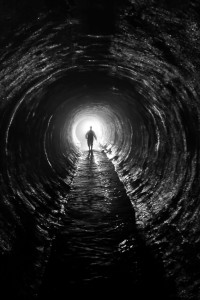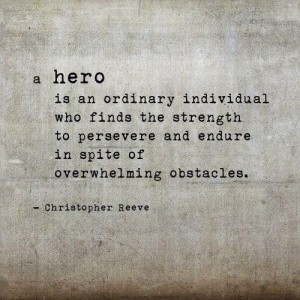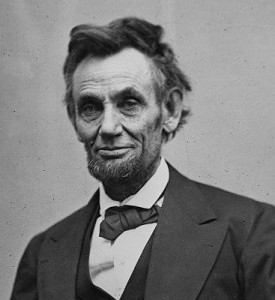Depression corrodes our sense of hope.
Elizabeth Wurtzel, in her her best-selling book Prozac Nation, wrote:
“That’s the thing about depression: A human being can survive almost anything, as long as she sees the end in sight. But depression is so insidious, and it compounds daily, that it’s impossible to ever see the end.”
We can’t imagine a future without depression. When we’re in the thick of its slimy grasp, our deadened and bleak state seems to go on and on and on. Days become more about survival and meeting our most basic obligations. And nothing more because we don’t have anything left to give. Our life becomes smaller. We’re treading water because there doesn’t seem an end in sight. We’re hit by the stun gun of depression.
Our most urgent hope is . . . the absence of depression.
But the absence of pain isn’t the presence of joy and all that makes life worth living. As Richard O’Connor, Ph.D. wrote in his book Undoing Depression:
“We confuse depression, sadness, and grief. However, the opposite of depression is not happiness, but vitality – the ability to experience the full range of emotions, including happiness, excitement, sadness, and grief. It’s not sadness or grief, it’s an illness.”
Amanda Knapp writes eloquently of her own experience:
“Depression, for me, is a miles deep crater that I believe I will never crawl out of. It’s disillusionment born of an unfulfilled longing for peace. It’s fear that hope will raise me up just to drop me even further down. It’s a cocoon of despair snuggled all around me doing its best to keep me from breaking when the inevitable fall comes. The irony in all of that is that it precludes me from living and dreaming and hoping and praying. But I hold on to it so strongly at times, as if my life depends on it. Because sometimes it feels like it does. But I sit here today, decently removed from the worst of those moments of despair, and I feel myself longing for hope.”
It’s critical that we deliberately nurture a hope better than just relief from our melancholy. We need to rise up out of the dust of our suffering. It’s not enough to exist. Our existence must matter. Living a life with meaning and purpose give us hope because it brings out the best in us – even with depression. And it’s a heroic journey.
I once wrote:
“In my view, folks with depression are not so much hapless, as they are heroes.What’s a hero after all? Someone who has a great challenge to confront? Check. Someone who must confront great adversity? Check. Someone who must get up every day and do battle with a formidable foe? Check. You see, for those of you who are struggling with depression right now, YOU ARE THAT PERSON. You’re the person who has to get up every day and cope with your depression. Others can help and support you, but it’s ultimately your walk to walk. And what a courageous walk it is; every single step of it.
Some of the best people that I’ve been privileged to know struggle with depression. While they don’t have shiny medals pinned on their lapels, there is an unmistakable strength in them – even if they don’t see it. I know it’s real because I see and feel it – just like when I am in a grove of giant and majestic pines during a walk in the forest.”
Dr. Anthony Scioli, author of Hope in the Age of Anxiety, writes that one of the things needed to build up our hope muscles is faith and a spiritual foundation (whether it be in God, nature or a higher power) to experience a more open attitude for developing faith in others as well as the universe.
Pope John Paul II once said,
“Do not abandon yourself to despair. We are the Easter people and hallelujah is our hope.”
So, nourish hope in your heart. Surround yourself with hopeful people, places and books.
And resolve to be hopeful.
Copyright, 2016 by Daniel T. Lukasik












